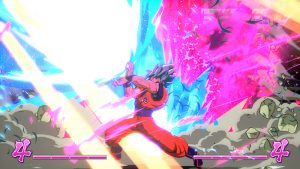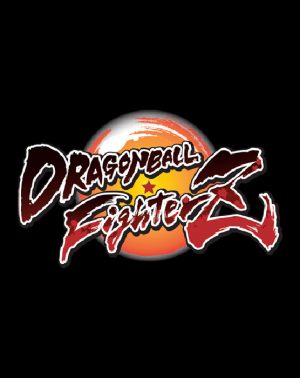
- System: PS4, Xbox One, PC (Windows), Steam
- Publisher: Bandai Namco Entertainment
- Developer: Arc System Works
- Release Date: 2018
- Price:$59.99
- Rating: Pending
- Genre: Fighting game
- Players: 1-2
- Official Website: https://www.bandainamcoent.com/games/dragon-ball-fighterz
What to Expect
DRAGON BALL FighterZ - E3 2017 Trailer | XB1, PS4, PC:
Who it Caters to
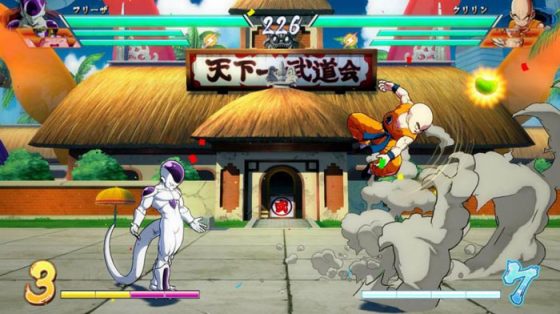
Denny Chu, Director, Communications & CSR of Bandai Namco Entertainment, elaborates “From the onset when we announced Dragon Ball FighterZ, we said from the get-go that we really want to build a fighting game community around this game and have it be a competitive, tournament-styled title… If there is a Dragon Ball title that is worthy of a tournament, I think FighterZ would have the best chance.”
In recent years, there’s been an absence of new 3-on-3 fighting games. The compelling visuals and gameplay mixed in with the thrill of fighting competent opponents make an addictive experience for the genre as a whole. There really is something special about the format of a 3v3 fighter--that extra assist, that inclusion of another favorite character, or that powerful anchor that stands firm through adversity. Dragon Ball FighterZ caters to an audience that favors a chaotic, adrenaline-inducing, formula brewed by its diverse and well-loved cast.
Gameplay
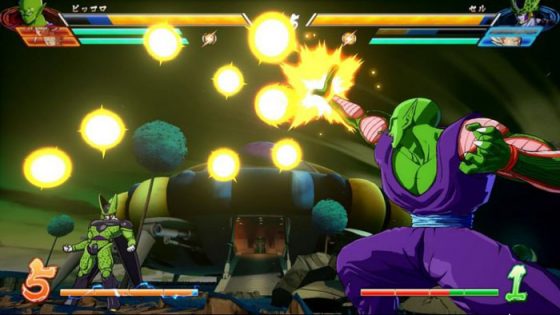
All of these factors--and truly the list goes on--factor into the decisions players make when creating a team. Even then, how one team functions early on might change later into the game’s lifespan. Fighting games are an elaborate genre with a constantly evolving metagame, a landscape shaped by the battling of new ideas and strategies. In the recent version of Dragon Ball FighterZ, the cast consists of the following: Goku, Vegeta, Gohan, Krillin, Piccolo, Trunks, Cell, Frieza, Majin Buu, Android 18, and Android 16. Each of these characters have their own individual strengths, weaknesses, style, and strategies.
How these characters interact with opponents depends on your awareness of the game and skill as a player. Majin Buu’s limbs can help control spaces where enemies want to dash in, Cell’s assist can lockdown opponent’s at a distance, Android 18’s level-1 super warps her to the opponent, but only limited distances--all of these small intricacies mold a complex structure into an adrenaline filled, tense gaming experience.
Players will have to be cognizant of character strengths and their opponent’s tendencies, each battle, giving more information and experience. Depending on whether you’re playing casually or competitively, both can appreciate how the game captures iconic Dragon Ball actions. Deflected blasts will fade into the scenery, finishing off opponents with supers destroy the stage, super moves interact differently depending on the opponent--the classic Gohan and Cell finish to their arc is re-enacted when both characters do their strongest supers.
The flow of this game matches that of the Dragon Ball series, pushing players to their limits as they make their own paths toward victory.
Basic Controls/Movement
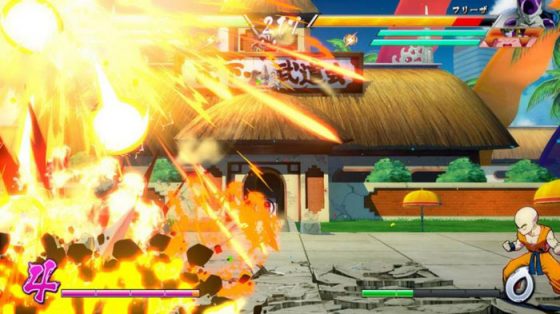
The Special Attack (A) button is dedicated to ki blasts, the iconic blasts of energy summoned in the Dragon Ball lore. Ki blasts can be used on the ground and held for multiple volleys, or thrown in the air as you move. Pressing back and the Special Attack button also makes your character deflect oncoming ki blasts, although not all projectiles can be deflected. There are two assist buttons, Left Bumper (Assist 1) will summon the second character on your team to do their respective special attack, and the Left Trigger (Assist 2) will summon the third character to do the same.
As you move throughout the screen or attack your opponent, your assist characters will act independent of what your main character is doing, a vital part of playing the game. Holding either button will switch your main character out for the corresponding second or third character. During supers, moves that require meter, indicated by the gauge on the bottom screen, if you press the Assist 1 or Assist 2 button, the respective character will appear and do their iconic super move. You can do this a max of two times, once for each assist, leaving the last character you called positioned inside the arena as your main character.
Pressing a combination of the above buttons gives a unique selection of techniques. Pressing the Light Attack and the Special Attack button will initiate a Ki Charge, your character gains meter for as long as you hold down the buttons. Next is the Vanishing Attack. By pressing the Medium and Heavy Attack buttons, you use 1 bar of meter to have your main character teleport behind the opponent and launch them towards the wall. This is useful to punish opponents at a distance, initiating offense with your assists, or extending combos.
Pressing Right Bumper or Light Attack and Medium Attack will do what’s called the Dragon Rush, an unblockable attack that can be done outside of combos to break an opponent’s guard or during combos to extend your damage or options. If the Dragon Rush is used outside of combos, however, the defender can “tech” it ( a term for repelling grabs) by pressing the same buttons, making it similar to normal throws in most fighting games. Pressing the Right Trigger or the Special Attack and Heavy Attack buttons will do the Super Dash, your main character hones-in and flies toward the opponent. Lastly, pressing the Right Bumper and Right Trigger or XYAB (every face button) will do the Sparking Blast. The Sparking Blast can be used only once per battle and it regenerates health while increasing your damage for a limited time.
Basic movement is intuitive. Blocking is done by either holding back or holding down+back. Jumping is done by holding up or up and forward/back. You can dash backward by simply pressing back twice or do a forward dash by pressing forward twice. Both Dashes can be done while in the air for an extra layer of movement.
New Character Reveals
- L, M, and H will refer to Light, Medium, and Heavy buttons respectively.
- S indicates the Special Attack button, the ki blasts button.
- 236 means QCF or quarter circle forward.
- 214 means QCB or quarter circle back.
- 22 means down twice.
Android 16 Special Attacks:
Dynamite Driver (236 L/M/H)
A command throw with variance in damage and options depending on the strength of the button. The light version does a quick throw from where he stands, but the opponent can choose a direction to bounce after waking up. The medium version has a slight pause then dash towards the opponent. He throws opponent forward, bouncing them off the wall. This can be followed up naturally with his anti-air command throw (listed below). The heavy version has the longest startup, but throws the opponent farthest The wall bounce properties are similar to the medium version.
Flying Power Bomb (214 L/M/H)
A command throw that can be used to end from his Dynamite Driver. The Flying Power Bomb can only grab airborne opponents, and its varying horizontal distance depends on the strength of the button with light being the closest, heavy being the farthest, and medium being the middle of the two extremes.
Flying Slide Powerbomb (236 L/M/H)
The airborne version of his command throw set. Unfortunately, I did not study this move in detail.
Hell Heat (236 S or 214 S)
The first version, Android 16 removes his hand and shoots a laser into the ground ahead of him. The second version, he shoots a laser into the ground in front of him. It is uncertain if this will hit opponents in a grounded state.
Super Attacks:
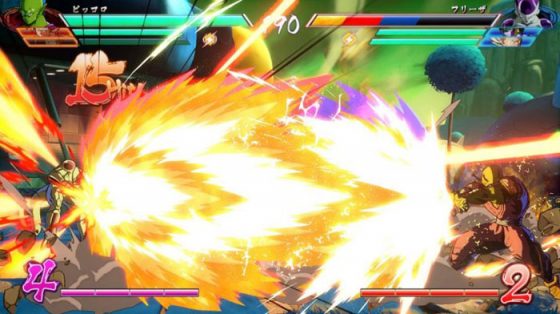
The super version of hell heat. Android 16 removes both hands and shoots lasers into the ground. Uncertain if this will hit opponents in a grounded state.
Hell Flash: Full Power (214 L+M)
The command grab variation of Hell Flash that requires 3 bars of meter. It reaches a decent distance away from Android 16 and has invulnerability, however, if the opponent was not committed to an attack, they are able to jump after seeing the animation. The damage output from this move is about 35% of the opponent’s health.
The Final Power that Should Be Used (214 H+S)
Android 16 takes a slow, desperate leap towards the opponent and explodes, his iconic self-sacrifice. This move costs 3 bars of meter, and if it lands, Android 16 is reduced to 1 pixel of health and the opponent takes massive amounts of damage (at least 50% of the opponent’s health).
Android 18 Special Attacks:
Back Grab (236 L/M/H)
A command throw that varies in speed and effect. The light version is the quickest. She throws the opponent behind her and stomps on them, but the opponent can choose a direction to bounce after waking up. The medium version has slower startup than the previous, however Android 17 appears in this version and spikes the opponent into the ground near Android 18. This version forces the opponent to wake up where they landed. The heavy version has the slowest startup, but the biggest reward. Android 17 appears and launches the opponent into the sky, allowing for you to continue with a combo.
Support Attack (214 L/M/H)
Android 18 summons Android 17 and he does a different attack depending on the button pressed. The light version summons Android 17 to do a very quick knee. The medium version has a slower startup, but Android 17 attacks farther away. The heavy version is a unique variation that costs 1 bar of meter. Android 17 is summoned behind 18, and he stands there while giving a monologue. Hitting him makes him disappear, but this works out in your favor.
The moment Android 17 disappears (naturally or by being hit), you can summon him again with the heavy version. Doing so has some startup, but he does 3 attacks, leaving Android 18 free to move independently of his actions. This move forces opponents into blocking, allowing Android 18 to start pressure or her mix up game. Air versions of this move exists, but at the moment, we’re unsure of the properties.
Destructo-Disc (236 S)
Android 18 summons a bright yellow disc of energy and lobs it at the opponent. This can travel fullscreen, allowing her to punish enemies from afar. It is uncertain how this move interacts with other projectiles.
Barrier (22 S)
Android 18 summons a barrier around her. It makes her invulnerable to projectiles during its duration by draining them. It is uncertain if this move can drain every projectile.
Super Attacks:
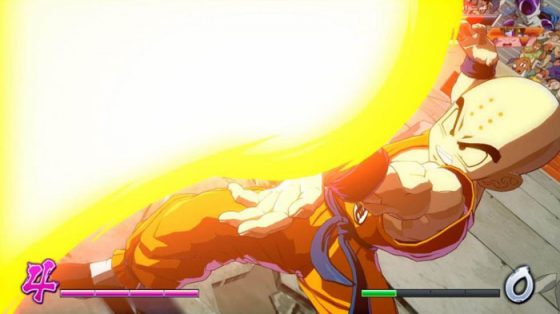
Android 18 teleports a short distance and appears from above. She launches a beam that fires directly below her. Although Android 18 does teleport, she cannot lock onto her opponent from far distances. It seems to be a good super to end on if you transition into it, but if you start with the super and transition to another member, the opponent can fly out of the radius of Energy Wave when getting hit.
Accel Dance (214 L+M or 214 H+S)
Android 18 rushes at the opponent alongside Android 17. This move costs 3 bars of meter, but if it connects, the opponent loses about 35% of their health. Android 18 can move directly after this move finishes, allowing her to mix up the opponent.
Honey's Gameplay Consensus:
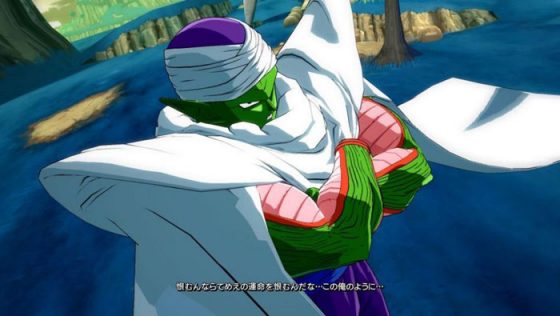
Honey's Pros:
- A loyal addition to the Dragon Ball franchise.
- Attacks have a superb attention to detail both visually and mechanically.
- Complex team dynamics allow for an amazing display of strategy and skill.
- Polished movement, making for a quick-paced fighting game that draws attention from its players and spectators.
Honey's Cons:
- Normally this section is for cons, but I think community members will understand when I jokingly say, “When’s Dragon Ball FighterZ?”
Honey's Final Verdict:
If you have any comments for the article or about the game, feel free to share them in the comment section below. I’d love to discuss details of the game or the Dragon Ball franchise!
Recommended Post


